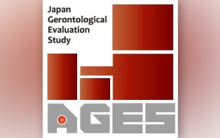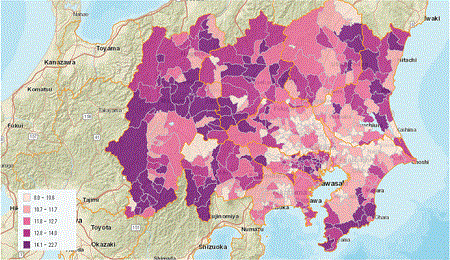Knowledge Translation for Healthy Ageing: the Japan Gerontological Evaluation Study (JAGES)

Start of project: May 2017; First draft: November 2017; External review & consultation: December 2017; Completion of project: May 2018
National Center for Geriatrics and Gerontology
Japan
Overview
This project sought to identify effective strategies to produce quality scientific evidence regarding the determinants of good health among older people and how to translate such knowledge into public health policy and practice. Specifically, it looked at the tools and strategies that have been instrumental for the success of the Japan Gerontological Evaluation Study (JAGES) in advancing social epidemiological research on ageing and health, and in influencing local and national government policies to be more responsive to the needs of an ageing population.
Project Background
The JAGES is the largest longitudinal survey of community-dwelling older adults in Japan. It takes a social epidemiological approach to understand the causes of health problems and inequalities in health at older age. It is especially notable for its strategic engagement with local and national governments to accelerate both the scientific research and the application of evidence to policies and programmes.
The project aimed to:
- Describe the strategies employed by JAGES to collaborate with local governments to conduct large-scale surveys of older adults.
- Review the body of scientific evidence accumulated by JAGES and its policy implications.
- Demonstrate effective methods for communicating research evidence to policy makers and practitioners, including the data visualization tool --JAGES Health Equity Assessment and Response Tool.
- 4. Illustrate JAGES’ impact across diverse municipalities using the examples of Kobe (Hyogo prefecture), Matsudo (Chiba prefecture) and Taketoyo (Aichi prefecture).

Example of a data visualization produced by the JAGES. Inequalities in the proportion (%) of older people (65 and over)
who have been certified as eligible for and in need of long-term care by municipalities in the Kanto Region.
Source: http://www.doctoral.co.jp/WebAtlas/201112WebAtlas/kanto/atlas.html
Results
JAGES stands as a model of translating evidence to policy.
Approaches that enhanced JAGES’ success included ensuring mutual benefits for researchers and municipal administrators, offering tools to facilitate the use of research evidence in policy making, and disseminating evidence for action in policy, practice and research.
The main output of the project is a monograph detailing the JAGES research methodology and key findings with respect to knowledge translation for healthy ageing. It was produced to facilitate adaptation of the tools and strategies of JAGES to other settings. The monograph also includes illustrative examples of how these processes have worked in practice in Japan.
Final Products
 Advancing universal health coverage through knowledge translation for healthy ageing: lessons learnt from the Japan Gerontological Evaluation Study (see also Publications page)
Advancing universal health coverage through knowledge translation for healthy ageing: lessons learnt from the Japan Gerontological Evaluation Study (see also Publications page)
 Policy brief: Promoting healthy ageing and universal health coverage through research (see PDF download links below)
Policy brief: Promoting healthy ageing and universal health coverage through research (see PDF download links below)
Peer-Reviewed Publications
- Rosenberg M, Kondo K, Kondo N, Shimada H, Arai H: Primary care approach to frailty: Japan’s latest trial in responding to the emerging needs of an ageing population. BMJ Integrated Healthcare Journal 2020;2:e000049
- Saito J, Haseda M, Amemiya A, Takagi D, Kondo K, Kondo N: Community-based care for healthy ageing: lessons from Japan. Bulletin of the World Health Organization 2019;97:570-574.
- Nagamine Y, Kondo N, Yokobayashi K, Ota A, Miyaguni Y, Sasaki Y, Tani Y, Kondo K. Socioeconomic disparity in the prevalence of objectively evaluated diabetes among older Japanese adults: JAGES cross-sectional data in 2010. J Epidemiology 2019; 29(8): 295–301
- Watanabe R, Kondo K, Saito T, et al. Change in municipality-level health-related social capital and depressive symptoms: ecological and 5-Year repeated cross-sectional study from the JAGES. Int J Environ Res Public Health 2019;16(11):2038. doi:10.3390/ijerph16112038
- Saito M, Kondo N, Oshio T, Tabuchi T, Kondo K. Relative deprivation, poverty, and mortality in Japanese older adults: a six-year follow-up of the JAGES cohort survey. Int. J. Environ. Res. Public Health 2019;16(2):182. doi:10.3390/ijerph16020182
- Tani Y, Suzuki N, Fujiwara T, Hanazato M, Kondo K. Neighborhood food environment and dementia incidence: the Japan Gerontological Evaluation Study cohort survey. American Journal of Preventive Medicine 2019;56(3):383-92.
- Amemiya A, Kondo N, Saito J, Saito M, Takagi D, Haseda M, Tani Y, Kondo K. Socioeconomic status and improvement in functional ability among older adults in Japan: a longitudinal study. BMC Public Health 2019;19:209.
- Tsuji T, Kondo K, Kondo N, Aida J, Takagi D. Development of a risk assessment scale predicting incident functional disability among older people: Japan Gerontological Evaluation Study. Geriatrics & Gerontology International 2018;18(10):1433-8. doi:10.1111/ggi.13503.
- Kanamori S, Takamiya T, Inoue S, Kai Y, Tsuji T, Kondo K. Frequency and pattern of exercise and depression after two years in older Japanese adults: the JAGES longitudinal study. Sci Rep. 2018;8(1):11224. doi: 10.1038/s41598-018-29053-x.
- Tani Y, Suzuki N, Fujiwara T. et al. Neighborhood food environment and mortality among older Japanese adults: results from the JAGES cohort study. Int J Behav Nutr Phys Act 2018;15:101. doi:10.1186/s12966-018-0732-y.
- Tsuji T, Miyaguni Y, Kanamori S, Hanazato M, Kondo K. Community-level sports group participation and older individuals’ depressive symptoms. Med Sci Sports Exerc. 2018;50(6):1199–1205.
- Yagi A, Hayasaka S, Ojima T, Sasaki Y, Tsuji T, Miyaguni Y, Nagamine Y, Namiki T, Kondo K. Bathing frequency and onset of functional disability among Japanese older adults: a prospective 3-year cohort study from the JAGES. J Epidemiol. 2018. doi: 10.2188/jea.JE20180123
- Zaitsu M, Kawachi I, Ashida T, Kondo K, Kondo N. Participation in community group activities among older adults: Is diversity of group membership associated with better self-rated health? J Epidemiology 2018;28(11):452-457. doi: 10.2188/jea.JE20170152.
- Aida J, Cable N, Zaninotto P, Tsuboya T, Tsakos G, Matsuyama Y, Ito K, Osaka K, Kondo K, Marmot MG, Watt RG. Social and behavioural determinants of the difference in survival among older adults in Japan and England. Gerontology 2018;64(3):266-277.
- Haseda M, Kondo N, Ashida T, Tani Y, Takagi D, Kondo K. Community social capital, built environment, and income-based inequality in depressive symptoms among older people in Japan: an ecological study from the JAGES project. J Epidemiol. 2018;28(3):108-116. doi: 10.2188/jea.JE20160216.
- Aida J, Hikichi H, Matsuyama Y, Sato Y, Tsuboya T, Tabuchi T, Koyama S, Subramanian SV, Kondo K, Osaka K, Kawachi I. Risk of mortality during and after the 2011 Great East Japan Earthquake and Tsunami among older coastal residents. Scientific Reports 2017;7(1):16591.
Research Team
Lead Institution: National Center for Geriatrics & Gerontology (NCGG)
Katsunori Kondo (PI), Director, Gerontological Evaluation Unit, Center for Gerontology and Social Science, and Professor & Director of the Center for Preventive Medical Sciences, Graduate School of Medicine, Chiba University
Hamamatsu University School of Medicine
Toshiyuki Ojima, Professor & Chair, Department of Community Health & Preventive Medicine
University of Tokyo Graduate School of Public Health
Naoki Kondo, Associate Professor, Social Epidemiology & Public Health and Chief, Department of Health Education & Health Sociology
Tohoku University Graduate School of Dentistry
Jun Aida, Associate Professor, Department of International & Community Oral Health
Nihon Fukushi University
Masashige Saito, Associate Professor
WHO Kobe Centre
Megumi Rosenberg, Technical Officer
Related Link
Related PDF downloads:
- Document
- Document
- Document
- Document

